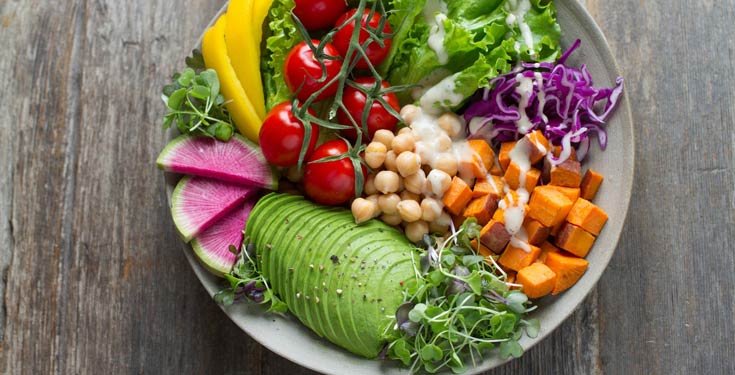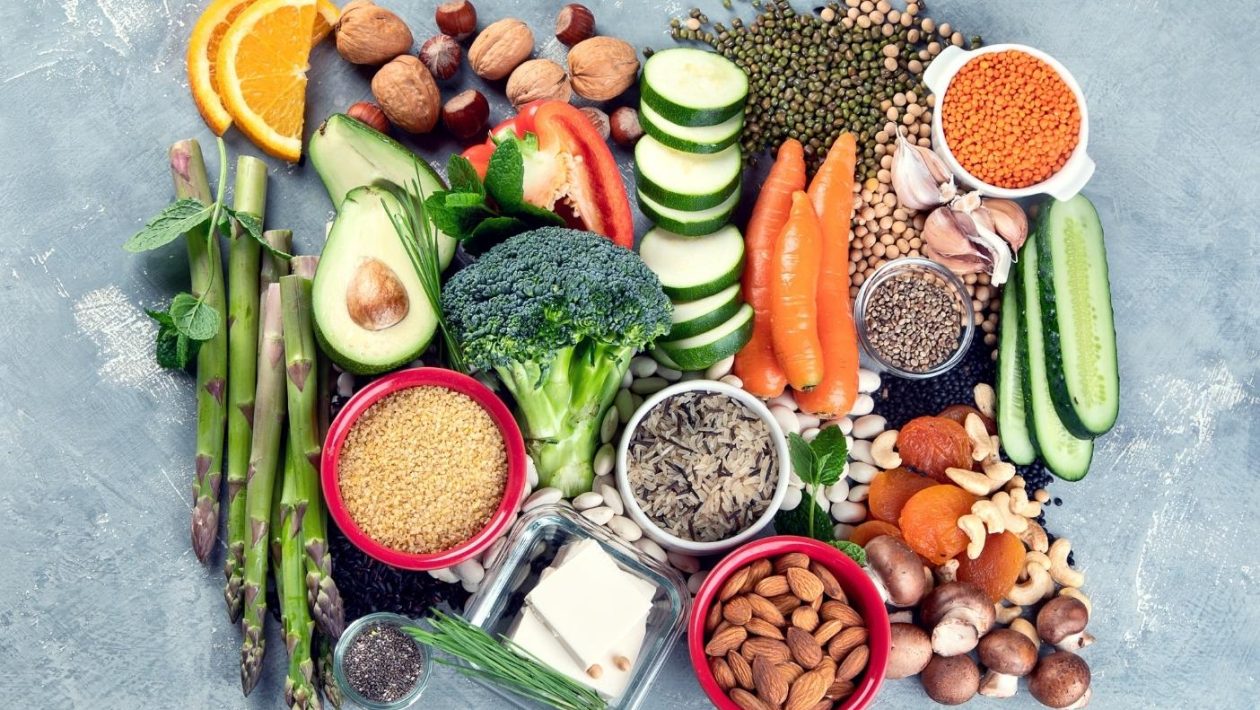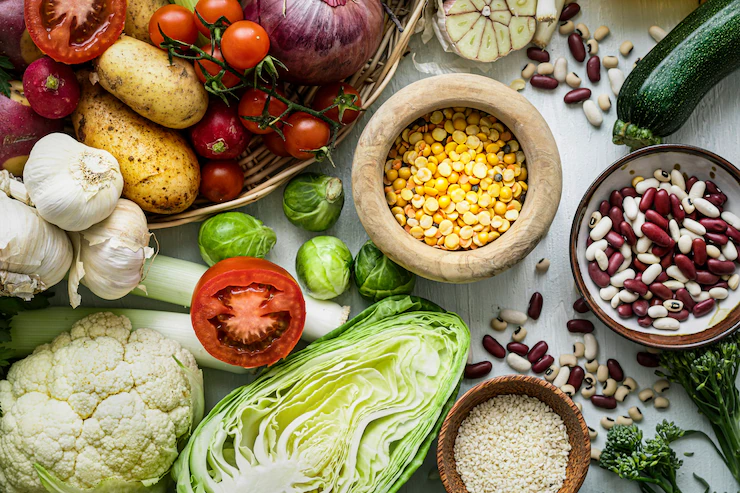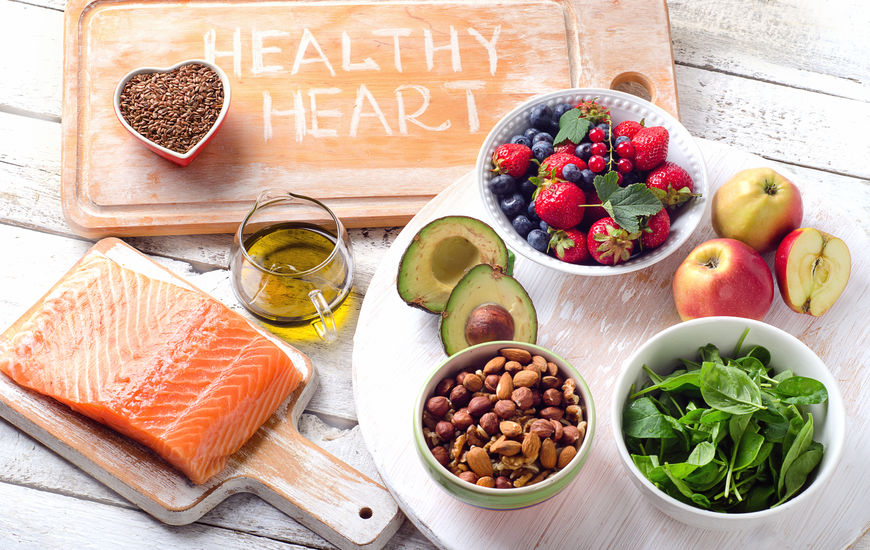Data analysis from Smidt Heart Institute at Cedars – Sinai revealed that there had been a spike in heart attack rates during the pandemic – which previously had been on the decline. The data also showed a significant rise among individuals aged 25-44 (age bracket not considered high-risk for heart attacks). With this data, nutritionists and health experts globally have propagated a new diet format – a plant-based variety. So, what is plant-based diet? Does it only have vegetables and fruits, or is there an addition of dairy? We will look into that –
This write-up will give you a precise idea of the concept, its benefits, evidence found in other diets, ways to kickstart this, and its ecological role. Scroll down to get the specific details –
Table of Contents
What is plant-based diet?
As evident from the name, a plant-based diet is one sourced from plants with no ingredients sourced from animals.
Along with vegetables, it also includes fruits, whole grains, legumes, and seeds. But unlike vegan or vegetarian diets, this plant-based diet includes (if you prefer) both poultry and dairy.
Some nutritionists also prescribe seafood to certain people following the plant-based diet if they are habituated to it. Multiple sources depict that a sudden diet change could lead to extended neurological problems for regular consumers of seafood.
How is it different from other diets?
Before you learn more about this diet, you must understand that a plant-based diet differs from a semi-vegetarian/vegetarian, pescatarian, or even a vegan diet.
For clarity – know that a vegetarian diet includes dairy and eggs but steers clear of meat. Semi-vegetarian (alternatively ‘flexitarian’) diet includes eggs and dairy, with occasional meat consumption. A pescatarian diet includes – dairy, eggs, fish, and seafood. But it does not have meat as part of it. A vegan diet has no animal food on its list – from eggs to meat.
This is the preliminary response to the query – what is plant-based diet? Now we will proceed to answer the benefits of this format.
What are the benefits of this diet?
If there is a follow-up query to what is plant-based diet, is, what are the key reasons for you to follow this diet? Here are some of the positives that this diet can bring forth for you –
1. Reduces inflammation of the body
For the record, inflammation occurs when the white blood cells fight off foreign particles such as bacteria or viral infections to save the body from any external attack. This may be chronic at times, where any external trigger causes a sudden hyper reaction or mistakenly the immune system attacks healthy tissue. Similarly, this may also be a localized inflammation caused due to a sudden injury.
When you follow a plant-based diet – your immune system heals from within, which reduces inflammation.
2. Improves kidney functioning – thereby reducing chances of diabetes
The nutrients – healthy fats, Omega 3, B12 (look for plant-based alternatives for this), and iron content which most nutritionists and dieticians agree is present in a plant-based diet – improve the functions of the kidney and reduce the chances of a diabetic attack. Multiple studies have shown that – people who consume red meat are more prone to having diabetes (an increase of 23%) vis a vis people who have a plant-based diet.
Not only has a plant-based diet helped reduce the rate of diabetic attacks, but also helped reverse Type 2 diabetes.
3. Reduces the risk of a heart disease
To advance your knowledge a bit more on a plant-based diet, we must tell you that it is a set of foods with high fibre content but low saturated fats. This is a win-win scenario for heart health and does not allow plaque formation along the sides of the arteries. Thus, the chances of cardiac arrest, clot formation, and artery blockage are negated.
4. Lowers the level of ‘bad’ cholesterol
It is no secret that ‘LDL’ cholesterol is bad for your body, and plant-based diet, when combined with fiber, soya, and nuts, makes for a killer combination to relieve you from the same. Balancing the ‘HDL’ cholesterol and reducing the ‘LDL’ format betters your overall health.
5. Reduces the risk of dementia and cognitive impairment
Hovering a little ahead of what is plant-based diet, is what its range of benefits are. A crucial benefit is – its role in brain development. According to a report published by Frontier in 2017, there was a direct correlation between shifting to a plant-based or vegetarian diet and its effects on the brain’s cognitive development.
This is primarily because – vitamins, folate, and antioxidants are packed in this format of diet and positively affect the body.
6. Improved gut health – betters athletic performance
The most significant benefit of a plant-based diet is – it improves gut health, promotes beneficial bacteria, and promotes a higher metabolism rate. With a better gut, naturally, you will have a healthier physical system which will undoubtedly impact you mentally.
Also, when the gut is strong, your immunity will improve, bowel movements will regularise, and the body will naturally balance the hormone system. This, by extension – will enhance the body’s athletic performance.
What is the speciality of a Mediterranean diet?
We do understand you may have a better idea of what is plant-based diet? However, certain queries still remain. Is there any evidence of the same? This is precisely the point we will discuss in this segment.
Unlike other global cuisines, the Mediterranean diet categorically has a foundation of a plant-based diet. But it also includes – fish, poultry, cheese, yoghurt, and eggs – a couple of times per week. In fact – all those strictly following this diet form are assured of getting treated with meat and sweets once in two weeks.
In random clinical trials and population studies – this Mediterranean diet reduces the risk of heart diseases, diabetes, and specific metabolic syndromes. This proves the extended benefits a plant-based diet will provide you.
Do you wish to start following this diet? This is the way to do the same –
How to start a plant-based diet?
A plant-based diet offers the required amount of carbohydrates, vitamins, minerals, fats, and protein – which are high in phytonutrients and fiber content. Therefore – be assured that your body does get what it requires from this diet (for non-vegetarians, an addition of poultry, eggs, and meat is required).
If you wish to start a plant-based routine, here are some steps to begin with –
#Step 1: Include as many vegetables as possible
The very first step in answering and following – what is plant-based diet is including a hefty amount of vegetables in your diet. Fill up half the plate – for both lunch and dinner with vegetables of different types, at times raw or boiled. You can also cook them in the usual way and have them by sprinkling black salt or oregano over them.
#Step 2: Change your thoughts on meat
To ideally follow this diet, you must change the way you look at meat. Rather than having wholesome pieces, use them in salads and in garnishing.
#Step 3: Choose your fats well
A burger or a pizza has quite an amount of fat, but it is unhealthy for the body. Whereas – avocados, olives, nuts, seeds, and butter are healthier alternatives.
#Step 4: Make a meal around a salad
Make salad your main course, rather than a side one. Prepare this with an assortment of green vegetables and match it up with herbs, tofu, or peas for garnishing.

#Step 5: Include whole grains for breakfast – fruits for desserts
Start your day with quinoa, buckwheat, and barley and follow it up with nuts and seeds. For a mid-morning meal or as a substitute for a dessert – fruits are a great alternative.
A sample of this diet?
If you have understood what is plant-based diet, and are convinced to follow the same – then it is important you get a sample of this diet. Here’s the same –
For Breakfast – Rolled oats with banana and walnuts with a sprinkling of cinnamon is the best option. You can also alternate it with – whole wheat tortilla wrap packed with scrambled egg, cheese, and black beans – with salt pepper garnishing.
For Lunch – Greek salad – a healthy mix of chopped greens, tomatoes, feta cheese, parsley, olives, virgin olive oil, and vinegar. You can also alternate this with – vegetable pizza with tomatoes, broccoli, mushroom, pepper, onions, and mozzarella cheese as a topping.
For Dinner – This is the best time to have grilled vegetables with spinach salad, quinoa, and tofu. You may also choose – whole wheat pasta with peas, beans, and tomatoes, garnished with vinegar and virgin olive oil.
#To get better results, you can follow this diet plan with intermittent fasting periods. This will enhance your weight loss process as well as heal the body from within. Here you can check out how to do intermittent fasting.
How is it ecologically sustainable?
As we near the end of responding to your query about – what is plant-based diet, a query that lingers on is – there are multiple things that one gets to hear about this form of diet. How much of it is accurate, and what is farcical? For the record – all the above-mentioned points are true, and additionally, this dieting format is ecologically sustainable.
It reduces greenhouse emissions and energy consumption. Also, with the enhancement of this form of diet, it protects rainforests, prevents species extinction, and combats world hunger. Therefore, this is ecologically sustainable in the long run.
Wrapping up
Do you have the answer to what is plant-based diet? If you have any further queries about the same or wish to share some information regarding this – do keep checking this website for details.
Monalisa Mukherjee is a content writer, copywriter and editor with 4 years of experience. She has written for websites like Biography Talk, The Rich Net Worth, Contour Cafe, He And She Fitness and Fiction Pad. She is currently associated with a noted Digital Marketing Agency and specialises in writing press release, guest posts, articles on travel, entertainment, food recipes, celebs, lifestyle, tech, health, and fashion.







